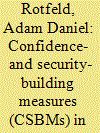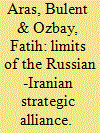|
|
|
Sort Order |
|
|
|
Items / Page
|
|
|
|
|
|
|
| Srl | Item |
| 1 |
ID:
083352


|
|
|
|
|
| Publication |
2008.
|
| Summary/Abstract |
Europe-China relationships have gone from praise to disappointment, from talk about lifting the European arms embargo to worries about trade deficit, monetary undervaluation and investment. A strategic partnership has never been fully achieved. The relationship is important in some areas, such as trade and finance; in others, it remains lightweight. The European Union has become China's first market abroad, while China is moving rapidly to the position of first supplier. China needs to maintain access to the European market, while Europe struggles for a share of the Chinese market. Europe is not a major strategic actor in Asia-Pacific security issues, and has been thought to exercise a soft influence that would complement the Sino-American strategic relationship. European leverage is actually quite limited. The causes within the European institutional setup include complex policymaking at the European level and competition among national leaders, particularly those of France, Germany and the UK. The European market itself provides some leverage, limited by the fact that Chinese exports include many parts from other Asian producers. Europe should reinforce policy coordination and transatlantic dialogue, including economic issues; attract Chinese investment to balance trade; and forge ties with the fast-growing Asian democracies. Interdependence with a rising China is a common interest, but its terms should strengthen the rules and values of the international system.
|
|
|
|
|
|
|
|
|
|
|
|
|
|
|
|
| 2 |
ID:
083348


|
|
|
|
|
| Publication |
2008.
|
| Summary/Abstract |
Every region has to elaborate its own confidence- and security-building measures (CSBMs) culture, while not abandoning the basic Organization for Security and Cooperation in Europe (OSCE) accords in this field. CSBMs cannot be seen as an aim in themselves. They have to be incorporated in the broader, emerging security regime. If our security is threatened, both internally and externally (from territories far away from Europe), our counteraction must correspond to the new nature of these threats. Although played down, the concept of CSBMs is not a thing of the past and may be a useful instrument in addressing various kinds of security issues, including those on the Korean peninsula. There is an urgent need to start a serious discussion on the overall concept of arms control and CSBMs and its place in the security-building processes. The main forum for European CSBMs remains the OSCE, although arms control efforts are also being developed outside its remit. The promotion of endeavors in this field would be much enhanced by having the European Union and NATO engaged more deeply in it. The question of CSBM implementation in the contiguous areas of the states which share frontiers with non-European, non-OSCE states remains outstanding. The current circumstances on Europe's perimeter bear evidence that the OSCE community cannot defer the issue interminably. The OSCE Partners for Cooperation need to be further encouraged to follow and get involved in the CSBM/arms control processes.
|
|
|
|
|
|
|
|
|
|
|
|
|
|
|
|
| 3 |
ID:
083349


|
|
|
|
|
| Publication |
2008.
|
| Summary/Abstract |
This paper focuses on the creation, development and current status of the concept of a "limited nuclear-weapon-free zone for Northeast Asia." While initial work was started in 1991 to develop a system to reinforce the South-North Korean nonaggression and denuclearization treaties, a more formal phase began in January 1995, when a panel of senior military officers met in Atlanta, Georgia. The original panel of general officer-rank specialists from China, Japan, South Korea, Russia and the United States grew in membership to eventually include Mongolia and North Korea, as well as observers from Argentina, Finland and France. The concept was refined in plenary meetings held in Buenos Aires; Bordeaux, France; Moscow; Helsinki; Tokyo; Seoul; Beijing; Ulaanbaatar, Mongolia; Jeju-do, South Korea; Shanghai and Tokyo. The 12th Plenary will be held in Daejeon, South Korea, in October 2008. While the concept of a limited nuclear-free zone has been developed, the international nonproliferation system has come under significant strain, as described in Paul Bracken's book, Fire in the East. Picking up on the theme introduced by Bracken that the world has entered the "second nuclear age," this paper argues that in light of the changed international environment, nuclear-free zones should be redefined and given new missions. Those new missions are to form the basis for new cooperative security systems in areas where regional security systems have yet to mature
|
|
|
|
|
|
|
|
|
|
|
|
|
|
|
|
| 4 |
ID:
083351


|
|
|
|
|
| Publication |
2008.
|
| Summary/Abstract |
The Russian and Iranian governments define their relations as "very close" and "strategic" in many areas. The frontiers of this cooperation, in geopolitical terms, include the south Caucasus, central Asia, Afghanistan, and the oil- and natural gas-rich Caspian basin, while, at the issue level, the cooperation includes the nuclear issue, disarmament, the struggle against terrorism, the Iraqi quagmire, the Palestinian problem, and the U.S. military expansion into Eurasia. The signs of cooperation in these areas are, among others, regular political dialogue and similar attitudes in refusing to include the Lebanese Hizballah on terrorist lists, pursuing political relations with Hamas, maintaining a pro-Arab position on the Arab-Israeli question, objecting to foreign military engagement in Eurasia, and having a common voice during the Israeli-Lebanese conflict in 2006. However, we need to discover the nature of these relations in order to decide whether the close Russian-Iranian relations can be described as a strategic alliance. What is the strategic depth of Russian-Iranian relations? Do the relations consist merely of the conjectural necessities of the post-Cold War period? What are the "red lines" in Russian-Iranian relations? This article analyzes the relations between these two countries from a broader perspective, to examine the meaning of the relations in bilateral, regional and international contexts
|
|
|
|
|
|
|
|
|
|
|
|
|
|
|
|
| 5 |
ID:
083353


|
|
|
|
|
| Publication |
2008.
|
| Summary/Abstract |
The continuing infringements of human rights in North Korea due to the totalitarian rule and inefficiency of the regime represent "a consistent pattern of gross and reliably attested violations of human rights." Thus, we can predict North Korea's future human rights conditions by examining the durability and diversity of the human rights policies adopted by Asia's communist states in their post-Stalinist or post-totalitarian stage when undertaking open and reform policies. Supposing that social control becomes ineffective, a continuing dynamic equilibrium will be secured through the reorganization of social institutions, where the existing ones have ceased to function. Such a situation will obviously pose a serious threat to the existing political regime. Thus, to protect their regime, the North Korean leaders will further violate the human rights of their people. Therefore, one of the most effective policy responses would be to induce the North Korean authorities to connect with international human rights protection systems without causing any immediate threat to the long-term stability of the North Korean regime. Accordingly, the current study examines possible forms of multilateral talks on North Korean human rights issues and relevant strategies that may induce North Korea's participation.
|
|
|
|
|
|
|
|
|
|
|
|
|
|
|
|
| 6 |
ID:
083350


|
|
|
|
|
| Publication |
2008.
|
| Summary/Abstract |
While the progress to date on denuclearizing North Korea is encouraging, proclaiming the end of nuclear threats in Northeast Asia is premature. First, North Korea has lately been having second thoughts with regard to full disclosure of its nuclear holdings. Second, and more seriously, the deterioration of Russo-American relations over nuclear issues is not confined to a strictly European agenda. Issues arising out of the Bush administration's nuclear strategy that seem to expand the parameters for first-strike use by America, the future of the Intermediate-Range Nuclear Forces (INF) treaty, and missile defenses in Asia in the context of revivified U.S. alliances in Asia have all appeared on the agenda and could lead to negative consequences for Asian security. Two potential consequences in particular could emerge. One could be a nuclear arms race between Moscow and Washington, while another could see further movement toward the consolidation of a genuine Sino-Russian bloc in opposition to what Moscow and Beijing both see as a consolidation of such a bloc around missile defenses and the strengthening of the U.S. alliance system in Asia
|
|
|
|
|
|
|
|
|
|
|
|
|
|
|
|
|
|
|
|
|